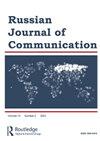谁是乌克兰的敌人:关于顿巴斯战争的军事传播叙事
Q1 Social Sciences
引用次数: 3
摘要
顿巴斯战争使乌克兰人的态度和价值观发生了重大变化。在2014年之前,军队被认为是一个完全腐败和过时的机构,现在却变成了这个国家最受信任的政治角色之一。大量志愿者参军,以及乌克兰人民随后提供的高水平财政支持,是这种转变的原因之一。所有这些因素,再加上乌克兰正在进行的低级别战争,解释了人们对军队如何与该国其他地区沟通的兴趣日益浓厚。本研究旨在更深入地研究乌克兰官方军事交流背后的叙事,并确定2014年至2017年期间发生的变化(如果有的话)。本研究的重点是了解军事机构如何看待顿巴斯战争以及通过何种叙事向其受众传达战争的差距。本文章由计算机程序翻译,如有差异,请以英文原文为准。
Who is Ukraine’s enemy: narratives in the military communication regarding the war in Donbas
ABSTRACT The war in Donbas has caused significant changes in the attitudes and values of Ukrainians. The army, which was considered a completely corrupt and outdated institution before 2014, turned into one of the country’s most trusted political actors. The significant stream of volunteers who joined the army, and the subsequent high level of financial support provided by Ukrainian people, are among the reasons for this shift. All of these factors, together with the ongoing low-grade war in Ukraine, explain the heightened interest in how the army communicates with the rest of the country. This research is aimed at looking more deeply at the narratives which underlie official military communication in Ukraine and to identify changes, if any, occurring throughout the period from 2014 to 2017. This study focuses on the gap in understanding how the military institution regards the war in Donbas and through which narratives it communicates the war to its audience.
求助全文
通过发布文献求助,成功后即可免费获取论文全文。
去求助
来源期刊

Russian Journal of Communication
Social Sciences-Political Science and International Relations
自引率
0.00%
发文量
0
期刊介绍:
Russian Journal of Communication (RJC) is an international peer-reviewed academic publication devoted to studies of communication in, with, and about Russia and Russian-speaking communities around the world. RJC welcomes both humanistic and social scientific scholarly approaches to communication, which is broadly construed to include mediated information as well as face-to-face interactions. RJC seeks papers and book reviews on topics including philosophy of communication, traditional and new media, film, literature, rhetoric, journalism, information-communication technologies, cultural practices, organizational and group dynamics, interpersonal communication, communication in instructional contexts, advertising, public relations, political campaigns, legal proceedings, environmental and health matters, and communication policy.
 求助内容:
求助内容: 应助结果提醒方式:
应助结果提醒方式:


